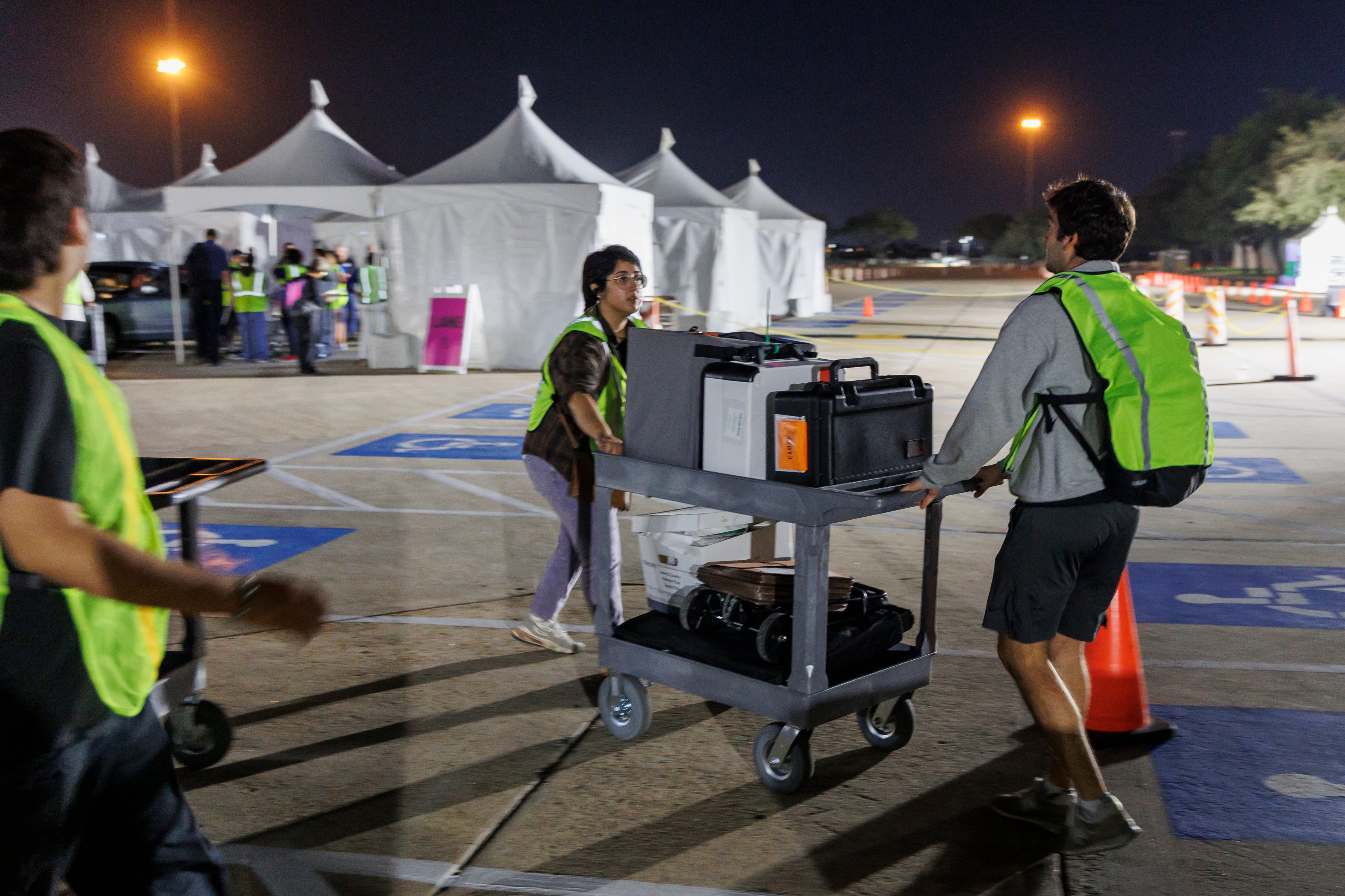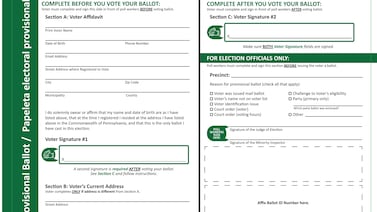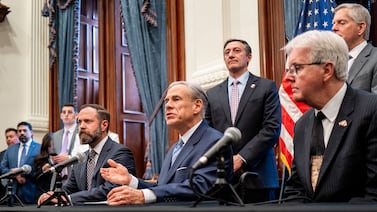Votebeat is a nonprofit news organization reporting on voting access and election administration across the U.S. Sign up for our free newsletters here.
The Texas House of Representatives voted Tuesday to force Harris County to eliminate its chief election official and to give state officials more authority over elections there.
On a 81–62 party line vote, House Republicans passed Senate Bill 1750, which will abolish the Harris County elections administrator position — a nonpartisan position appointed by local elected officials — and return all election duties to the county clerk and tax assessor-collector.
Failed amendments by Democrats would have changed the new law’s effective date to December, instead of Sept. 1, to give county officials time to conduct the November county and municipal elections and to transfer the duties. Another failed amendment would have given the authority to transfer election duties to the county commissioners. The bill is now on its way to Republican Gov. Greg Abbott’s desk — and could ultimately face Harris County’s opposition in court.
Harris County Elections Administrator Clifford Tatum said in a statement to Votebeat that when the provision takes effect in September, it’ll be 39 days from the voter registration deadline and 52 days from the first day of early voting for a countywide election that includes the Houston mayoral race.
“We fear this time frame would not be adequate for such a substantial change in administration, and that Harris County voters and election workers may be the ones to pay the price,” Tatum said.
Also approved Monday was a bill that would let the Texas secretary of state intervene in local elections. It would grant the state the authority to investigate election “irregularities” after complaints are filed and the authority to order the removal of a county election administrator or to file a petition to remove a county officer overseeing elections, such as a clerk, if “a recurring pattern of problems” isn’t resolved. The secretary’s current role in elections is only to guide and assist counties, with no oversight powers.
Senate Bill 1933 was originally written to apply to all counties but was amended on the House floor to impact only Harris County, by the House sponsor of the measure, Rep. Tom Oliverson, R-Cypress. The House’s changes to the bill now have to receive approval from the Senate this week.
The set of bills aimed at the state’s most populous county — and third most populous in the nation — were among about a dozen bills authored by Sen. Paul Bettencourt, R-Houston, who has said Harris County election problems in the past year were the “genesis” of the proposals. The Republican-controlled Texas Legislature in recent years has made it a priority to claw back power from cities and counties, often run by Democrats. Lawmakers this year are poised to put new restrictions on all cities that issue local rules that go further than state law, including labor, agriculture, natural resources and finance.
In last November’s general election, Harris County had to extend voting for an hour after various polling places had malfunctioning voting machines, paper ballot shortages and long waiting periods. More than 20 lawsuits from losing Republican candidates have been filed against the county, citing those problems and seeking a redo of the election.
Tatum, the county’s second elections administrator since the position was created in 2020, was hired only two months before November’s election. At the time, Harris County’s election department lacked a tracking system used by large counties to identify issues in real time and for months could not say how many polling locations ran out of paper on Election Day or whether anyone was prevented from voting. A recent investigation by the Houston Chronicle found that out of the more than 782 polling locations, only about 20 ran out of paper.
Tatum said Harris County is unique in “its diverse population, geographical size and number of registered voters and with that comes a unique set of challenges when it comes to running these countywide elections,” Tatum said. “There has never been a flawless countywide election in Harris County, no matter which office or party has conducted the election… The only solution to the issues seen in this County is stability in legislation and in administrative processes and procedures.”
The Texas Election Code allows counties’ commissioners courts, based on their individual needs, to assign election duties to the county clerk and tax assessor-collector — which are elected positions — or to create an elections department and appoint a nonpartisan elections administrator.
Harris was the last large county in Texas to create an elections department and appoint an elections administrator. County leaders appointed an inexperienced elections administrator in 2020 to lead the newly created department in a county with more than 2 million registered voters. Isabel Longoria resigned in July 2022 after the department failed to report unofficial primary election vote totals to the state by the deadline required by law. Tatum, the new elections administrator who has years of experience running elections, inherited Longoria’s department with very little time to fix lingering administrative problems when he was appointed to his role in August.
Harris County leaders say the two bills would set a “dangerous precedent.” That’s why the county is now evaluating whether they can take legal action if the proposals become law.
County Attorney Christian D. Menefee in a statement said state legislators are singling out Harris County “to score cheap political points.”
“I want to be clear: this fight is not over,” Menefee said. “We cannot and will not allow the state to illegally target Harris County.”
Democratic Harris County legislators spoke against the bill on the House floor Tuesday and said the goal of the pieces of legislation was to “punish” the county and take away local control.
Rep. Jarvis Johnson, D-Houston, said the Republican-led state legislature wanted to go into Harris County, a Democratic county, and change it, “for no reason.”
“When y’all see something y’all don’t like, you change it to make sure it fits you,” he said. “All of these Harris County bills are disingenuous and not fair. Don’t come to my community and do something that I didn’t ask you to do. That’s harmful, because when you don’t know the community you can do damage. So it’s very harmful.”
In a statement Monday evening, Harris County Republican Party Chair Cindy Siegel praised the passage of the approval of the bills.
“Ultimately, if the [elections administrator] could pull off an election without major problems, the state legislature wouldn’t have had to step in,” Siegel said. “Unfortunately, as we’ve seen from unprecedented issues, whether that be missing ballots or ballot paper shortages and everything in between, they can’t get it right. Someone eventually has to step in and say, ‘Enough,’ and today, the Texas Legislature did exactly that by passing SB 1750.”
Some election and voting rights advocates say the continuous legislative changes to elections –specifically targeting Harris County– will have negative consequences for voters.
“All of these changes together are forcing Harris County voters to live in a different set of circumstances than the rest of the state. This is creating a disparate scenario for those voters and barriers to well run elections,” said Katya Ehresman, voting rights program director at Common Cause Texas. “There’s a clear partisan element to that with Harris County growing in its Democratic stronghold. But there’s also definitely a disparate racial impact element to these bills continuing to pass as the county is home to the largest population of Black, brown, [Asian American and Pacific Islander] voters in the state.”
Natalia Contreras covers election administration and voting access for Votebeat in partnership with The Texas Tribune. Contact Natalia at ncontreras@votebeat.org.







